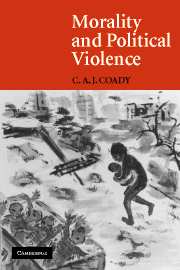Book contents
- Frontmatter
- Contents
- Preface
- Morality and Political Violence
- 1 Staring at Armageddon
- 2 The Idea of Violence
- 3 Violence and Justice
- 4 Aggression, Defence, and Just Cause
- 5 Justice with Prudence
- 6 The Right Way to Fight
- 7 The Problem of Collateral Damage
- 8 The Morality of Terrorism
- 9 The Immunities of Combatants
- 10 Morality and the Mercenary Warrior
- 11 Objecting Morally
- 12 Weapons of Mass Destruction
- 13 The Ideal of Peace
- 14 The Issue of Stringency
- Bibliography
- Index
- Frontmatter
- Contents
- Preface
- Morality and Political Violence
- 1 Staring at Armageddon
- 2 The Idea of Violence
- 3 Violence and Justice
- 4 Aggression, Defence, and Just Cause
- 5 Justice with Prudence
- 6 The Right Way to Fight
- 7 The Problem of Collateral Damage
- 8 The Morality of Terrorism
- 9 The Immunities of Combatants
- 10 Morality and the Mercenary Warrior
- 11 Objecting Morally
- 12 Weapons of Mass Destruction
- 13 The Ideal of Peace
- 14 The Issue of Stringency
- Bibliography
- Index
Summary
Prepare for war with peace in thy soul.
The Bhagavad Gita, 2.38There can be no doubt that the value of peace has served as a significant inspiration for theorists and activists over the centuries. Thomas Hobbes made the pursuit of peace a foundation stone of his laws of nature and a reiterated theme in his discussion and elaboration of them, and they, in turn, supported his whole ethic and political philosophy. His first “and fundamental” law of nature is “to seek Peace and follow it.” Pacifists, of course, are devoted to peace, but many nonpacifists claim an equal dedication, even if it lacks the same consequences. As mentioned in Chapter 1, the United States Strategic Air Command, whose constant task was to maintain the credibility of nuclear devastation, even had as its motto “Peace is our profession,” without any apparent awareness of the delightful ambiguity contained in the word “profession.” Hugo Grotius called his famous treatise on the law of war The Rights of War and Peace (De Jure Belli Ac Pacis), and declared “the unabated desire and invariable prospect of peace” to be “the only end for which hostilities can be lawfully begun.” The Lieber Code says of many nations and great governments related to one another in close intercourse in “modern times”: “Peace is their normal condition; war is the exception. The ultimate object of all modern war is a renewed state of peace.”
- Type
- Chapter
- Information
- Morality and Political Violence , pp. 263 - 282Publisher: Cambridge University PressPrint publication year: 2007



